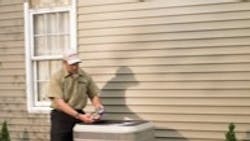Don't forget to perform winter maintenance on heat pumps
By DOUG PRIESTLEY
The first step of proper preventive maintenance is to speak with the homeowner about potential product problems and/or concerns. Ask how their system operated during the summer months. The homeowner can provide you with clues about potential problems with the system.
More importantly, you are building a rapport with your customer that will build a high level of trust for future business transactions and services.
Secondly, when servicing heat pumps, certain maintenance checks are necessary to ensure the unit is working at its peak performance and efficiency. Remember to test the back-up heat and defrost for proper operation.
Here are some additional maintenance tips, provided below, for inspection of the indoor unit, outdoor unit, thermostat and the general operation of the heating and cooling system.
Indoor Unit Inspection
When inspecting the indoor unit, be sure to check the air filter and electrical connections, and clean the coil. The following information is a useful guideline for proper indoor unit inspection:
- Inspect the air filter. Depending on the condition of the filter, clean it or replace it with a new one.
- Inspect the electrical wires to ensure a tight connection exists. Loose connections can cause wires to overheat and burn up.
- Oil the blower motor or bearings if necessary. Inspect the blower wheel for balance and cleanliness.
- Inspect and clean the indoor coil and drain pan.Use a cleaner that's suitable for indoor coils.
- Flush and clean the drain line. Remember to prime the trap, if necessary.
- Turn on the auxiliary strip heat forinspection.Iftheunituses electric heat, check all of the wiring for discoloration and heat damage. Replace all damaged wires.
- Check the amperages of the electric elements. Verify the elements are staging on properly and shutting down properly.
- For dual-fuel applications, conduct the appropriate preventive maintenance for gas furnaces.
Outdoor Unit Inspection
A well-maintained condensing unit coil is vital to proper heat pump operation. Other outdoor unit maintenance includes:
- Inspect the condensing unit's base-pan drain holes and remove any debris.
- Check the unit's wiring connec-tions and the wiring insulation. Repair any damage.
- Oil the condensing-fan motor, inspectthefanbladeforany damage, and balance.
- Verify the outdoor temperature sensor(s) are in the proper location.
Thermostat
The thermostat is an essential element of the heat pump system. Be sure to include it in your winter maintenance inspection. Verify all connections are tight on the sub-base of the thermostat and that the thermostat is level.
General Operation Maintenance
Preventive maintenance of heat pumps can lead to peace of mind for the homeowner. Many potential problems can be alleviated, and it may stop you from receiving late night maintenance calls when it's cold outside.
Doug Priestley is supervisor, NORDYNE Technical Service Department. To reach him, e-mail [email protected].
